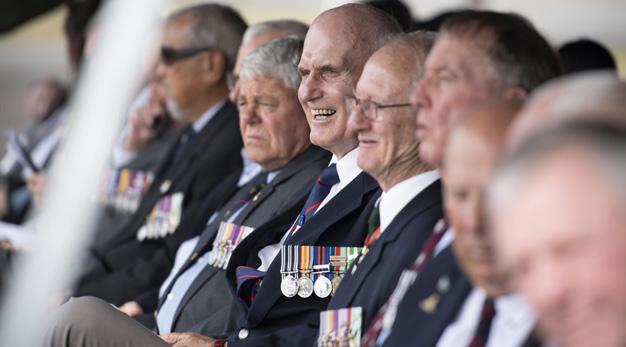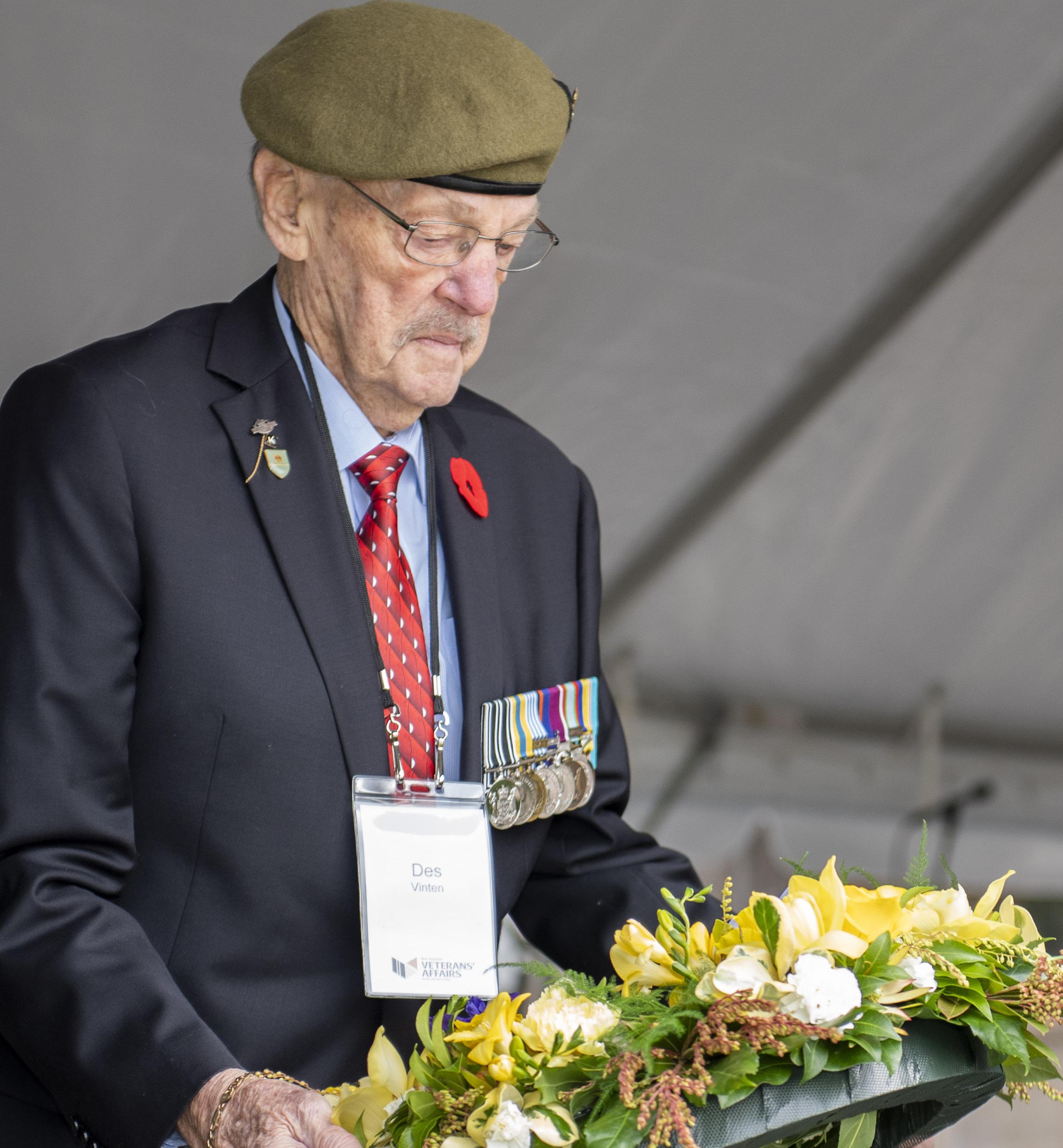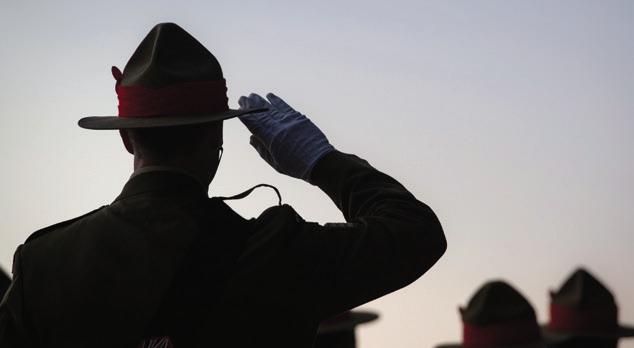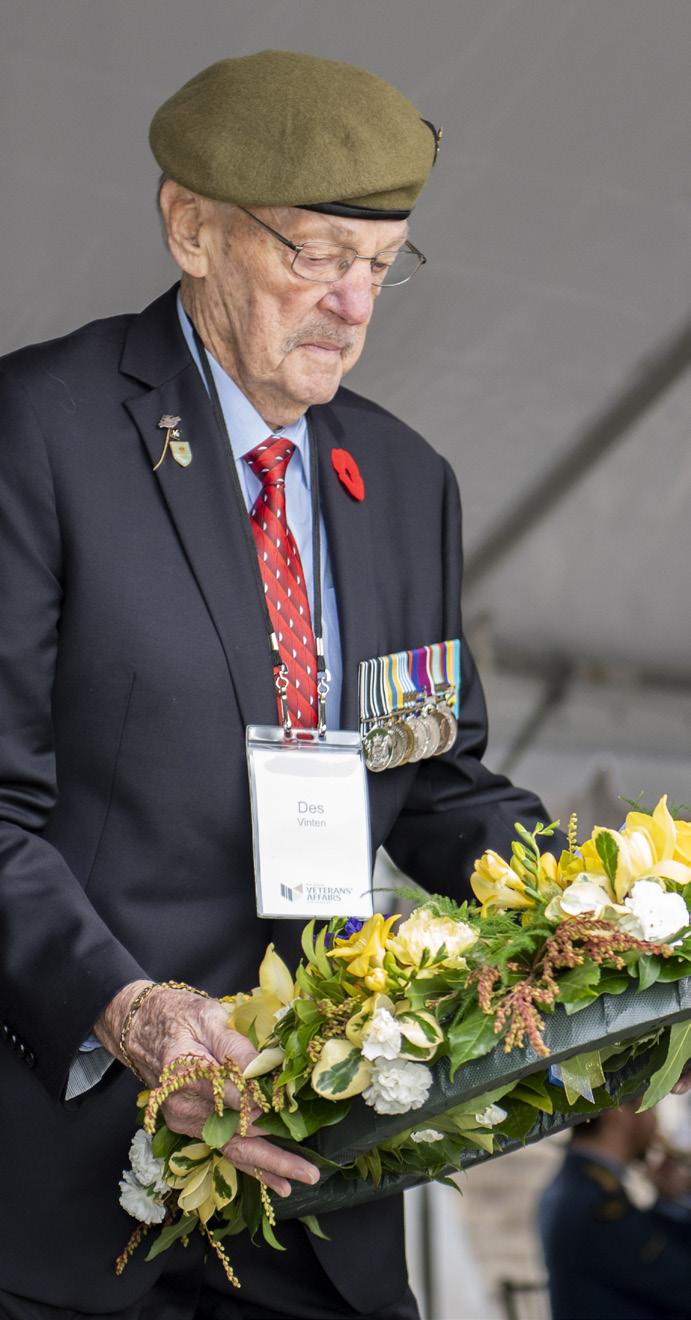


03 75th anniversary of the end of the Second World War commemorated
04 Mike’s minute
06 70th anniversary of the Korean War




03 75th anniversary of the end of the Second World War commemorated
04 Mike’s minute
06 70th anniversary of the Korean War
2020 has already been an extraordinary year.
10
12
VA News is published four times a year by Veterans’ Affairs New Zealand— Te Tira Ahu Ika A Whiro. Our team takes care in writing great content and—to the best of our knowledge—has sourced accurate information.
The views expressed in VA News are not necessarily those of Veterans’ Affairs or the New Zealand Defence Force.
For more information about Veterans’ Affairs or anything in this edition of VA News:
www.veteransaffairs.mil.nz
veterans@nzdf.mil.nz
0800 483 8372 (Freephone New Zealand)

1800 483 837 (Freephone Australia)
+64 4 495 2070 (rest of world)
Veterans’ Affairs PO Box 5146
Wellington 6140 New Zealand
Please note our Hamilton PO Box is now closed.
Cover image: Des Vinten lays a memorial wreath on the Tomb of the Unknown Warrior. More on page 6.
In my last message to you I wrote about the new world we had found ourselves in as a result of COVID-19. There were so many new words and concepts that quickly became part of our lives – like alert levels, bubbles, lockdowns, virtual gatherings, and zooms. Three months on, one thing now seems very clear – that changed environment is going to be with us for a long time. We’re all having to adapt to it – and will need to keep adapting. Here at VA, we’re now back at our desks, but things aren’t the same as they used to be. COVID-19 has become the backdrop that’s going to be shaping all that we do, now and for some time to come. That means we’re going to have to do things differently, and we’ll need to work with you to make sure that the changes we make will suit you and will make it easier for you in your dealings with us.
Over the last few years, we’ve introduced several new ways of staying in touch with you and your families. Just over a year ago we ventured on to social media with a Facebook page that now has over 2,500 followers. We’ve set up an email newsletter that a number of you now subscribe to; and last year we started offering case management clinics at the Ranfurly Veterans’ Centre. A number of you have come to our health and wellness expos over the past two years – and the community forums we’ve held, both here and in Australia, where you can come along and meet some of our case managers face-to-face, are always popular.
Bernadine Mackenzie, Head of Veterans’ Affairs
But given how uncertain things are at the moment, we know that we’ll need to do more. So we want to put in place some new ways for you to do business with us, and check things out with us, when this can’t be done in person. Over the next couple of months we’ll be telling you more about the sorts of things we’re thinking of introducing, and asking you for your thoughts about whether they could be helpful.
Whatever changes we make will be done with the aim of making sure we’re there for you and able to support you when you need us, particularly in difficult and uncertain times.
I hope you enjoy this issue of VA News Stay safe and take care.
BernadineOn August 15 an Act of Remembrance was held at Pukeahu National War Memorial to mark the 75th anniversary of the end of the Second World War.


A public event had been planned, however this was cancelled after New Zealand moved into COVID-19 Alert Level 2 and Auckland moved into COVID-19 Alert Level 3. The small ceremony was attended by GovernorGeneral Dame Patsy Reddy, Prime Minister Jacinda Ardern, Minister for Veterans Ron Mark, Chief of Defence Force Air Marshal Kevin Short, and members of the Diplomatic Corps. More than 140,000 New Zealand men and women served as part of New Zealand’s war effort both at home and abroad. Close to 12,000 lost their lives. About 12,000 personnel served
as part of J-Force in Japan from 1946 to 1949, with 15 losing their lives. More than 700 New Zealand Second World War veterans are alive today.
Air Marshal Short wore the Haane Manahi sword. Lance-Sergeant Haane Manahi, of Te Arawa and the 28 (Māori) Battalion, was awarded the Distinguished Conduct Medal for his bravery in leading the capture of an enemy stronghold in the Battle of Takrouna, in Italy, in 1943.
Queen Elizabeth II presented the sword to Te Arawa in 2007, who in turn presented it to the Chief of Defence Force.
Air Marshal Kevin Short said he wanted to acknowledge the service and sacrifice of the men and women who fought. “All New Zealanders owe you and your comrades a great debt of gratitude for what you suffered and achieved for our country during the Second World War.”
“It is our honour and duty to remember and honour those New Zealanders who fought and died in the Second World War, and we will continue to defend the values they upheld with such valour.”
VA News sat down with Dr Mike O’Reilly, our clinical advisor here at VA. Part of his role right now is reviewing decisions made about claims. Mike has served in the regular and reserve forces for over 30 years, which includes 20 years as a medical officer.

Hi Mike, first things first, what are Statements of Principles?
Mike: Statements of Principles are decision making tools that we are legally obliged to use when veterans make claims. Each Statement deals with a condition that evidence shows to be linked to service. Each one is based on thousands of hours of research across a number of countries, including Australia, the United Kingdom, and the United States. There are two points that it’s important to understand about these Statements. They’re expressed in a very veteranbenevolent way and they’re evidencebased. They show links between certain environments and occupational hazards, and conditions that veterans may develop during or after service. When considering the research and standards that are used for each Statement, the authors of the Statements must err on the side of the veteran and Statements that make it harder for veterans to get coverage are not accepted by the Minister for Veterans.
VA News: Can you give us an example of how you use a Statement of Principles to make a decision?
Mike: When reviewing a claim for a condition, such as osteoarthritis, I have to base the review decision on the Statement. The Statement for osteoarthritis requires that the disease be related to certain exposures or experiences in service, such as lifting 150,000 kgs over 10 years, and that it be diagnosed within a certain period after the veteran completed their service.
Another example condition is acquired cataracts. The Statement for acquired cataracts states that a veterans needs to have 2,500 hours of exposure to UV light in a tropical environment. This is based on our knowledge of how long it takes for exposure to cause the disease. If you’ve never left New Zealand, or your deployment wasn’t to a tropical environment, we can’t apply that science to you. We can’t use that as a factor to determine that the condition is as service-related. Even if a veteran thinks that the condition is service-related, we have to use the science to determine if it is.
VA News: It sounds like there is a lot involved in how you make decisions!
Mike: It’s not really a line in the sand, it’s a process of gathering and processing information. We feel for every claimant and we do our best to consider all the relevant information we possibly can. I will always look for any way that I can to apply or interpret a Statement in favour of a veteran.
When we do deny veterans coverage for conditions, it’s because there is no evidence or reason to assume that the veteran was exposed to factors that could have caused their condition. We want to accept as many claims by veterans as possible, but we have to do it fairly for everybody. Measuring all claims against the relevant Statement of Principles helps us to make sure this happens.

“I will always look for any way that I can to apply or interpret a Statement in favour of a veteran.”
– Dr Mike O’ReillyMike with the 2017 NZDF Invictus Team where he was a team doctor.

Ten Korean War veterans were joined by Prime Minister Jacinda Ardern, South Korean Ambassador Sang-jin Lee, Minister for Veterans Ron Mark, Chief of Defence Force Air Marshal Kevin Short, Chief of Army Major General John Boswell, and Head of Veterans Affairs Bernadine Mackenzie at the commemoration at Pukeahu National War Memorial.

While the armed conflict lasted from 1950–53 and ended with an armistice but no peace treaty, from 1950 to 1957 more than 6,000 New Zealanders served in Korea on land and sea as part of Kayforce.
During that time 45 New Zealanders died and 81 were wounded. Thirtythree of those who died are buried in the United Nations Cemetery in Busan, South Korea. About 500 New Zealand Korean War veterans are alive today.
One of those veterans who was at the commemoration was Des Vinten, who served in Korea as a dispatch rider from 1951–53.
Mr Vinten said it was good to see that their service in Korea had made a difference.
“I’ve been back to Seoul four times and I’m constantly amazed at what’s happened in those 70 years. The difference between Korea in 1951 and Korea today is absolutely incredible.”
Ms Mackenzie said it was always a special moment when veterans gathered to remember their service and honour those who had fallen.

“It is also heartening for them to know that their service was valued,” she said.
Mr Lee said New Zealand was one of the first countries to respond to the United Nations call for assistance in the Korean War.
“On behalf of the government and the people of the Republic of Korea, I would like to express my special gratitude to the Korean War veterans,” he said.
“Korea’s recovery from the destruction of the war and active participation in the international society today would not have been possible without the help of good friends like New Zealand.”
The service and sacrifice of New Zealand Defence Force personnel in the Korean War was remembered at a commemoration in July to mark the 70th anniversary of the outbreak of the war.
“I’ve been back to Seoul four times and I’m constantly amazed at what’s happened in those 70 years.”
– Des Vinten, Korean War VeteranPictured opposite: Colin Smith, Tony Smith, Chris Nevill, Phil Harland, Alan Cull, Les Pye, Roy Robieson, Minister for Veterans Ron Mark, Bruce Diggle, and Phil Wallace. Above: Des Vinten laying the commemorative wreath at the Tomb of the Unknown Warrior. Left: Roy Robieson and Elaine Myers-Davies.
From 9 November 2020, Work and Income will no longer make deductions from your NZ Super or Veteran’s Pension because of your partner’s overseas pension.
Some people getting NZ Super or the Veteran’s Pension can include their partner or spouse who doesn’t qualify in their own right. This is called including a non-qualifying partner in your payment.
If you already include your non-qualifying partner or spouse in your NZ Super or Veteran’s Pension payment, you will continue to receive payments so long as your partner or spouse meets the eligibility criteria.
If you remove your partner or spouse from your payment, you won’t be able to include them again from 9 November 2020. You also can’t apply to include your partner after this date.
You can still apply to include your partner or spouse in your NZ Super or Veteran’s Pension payment until 8 November 2020.
If you’d like to include your partner or spouse, contact Work and Income. If your partner or spouse doesn’t meet the eligibility criteria, they’ll talk with both of you about other types of support you may be able to get.
Over the next few months, Work and Income will contact people affected by these changes. For more information, you can call them or check out their website.
0800 552 002
www.workandincome.govt.nz
The 4-digit number is free to call or text, and will connect you to a trained counsellor. It's available 24 hours a day, 7 days a week.


NZDF Force4Families has launched their new website and online-only discount card. Veterans can register for the online-only discount card at force4families.mil.nz. Once you’ve registered online you can access a range of amazing discounts both online and in store. There are also discounts available for tertiary study. Veterans can receive 30% off standard tuition fees at Massey University and Universal College of Learning, and 50% off standard tuition fees at Open Polytechnic. To get this discount, use either the code provided at force4families.mil.nz or show your online-only discount card when you register to study.
Case management clinics are a chance to book a one-onone appointment with a Veterans’ Affairs case manager. These clinics are designed for both:
• current clients – both veterans and whānau
• veterans who are not already getting support from us.
Appointments are available between 10am and 2pm for up to 40 minutes.
OCT 28 Wednesday, 28 October 2020
NOV 25 Wednesday, 25 November 2020
Ranfurly Veterans’ Centre, 539 Mount Albert Road, Three Kings, Auckland 1042
To book an appointment get in touch with us: 0800 483 8372
veterans@nzdf.mil.nz
From 9 November 2020, there will be changes to NZ Super and the Veteran’s Pension. The changes affect the option to include a non-qualifying partner or spouse in your payment and overseas pension deductions.
Earlier this year the Minister for Veterans announced the launch of a national survey led by the Veterans’ Advisory Board.
The survey gauged New Zealanders’ views on recognition and support for service personnel, and what they think about establishing a formal agreement such as a Kawenata (Covenant) between service personnel, the Government, and the people of New Zealand.
The survey results show that even though the public holds low levels of knowledge about service personnel and their lives, they feel that there is a moral obligation for New Zealand to support service personnel and their whānau. A key finding of the report showed that respondents believe that a Kawenata could benefit service personnel and their whānau. The report outlines a number of recommendations, including that a Kawenata should be developed.
To read the full report, visit the Veterans’ Affairs website. veteransaffairs.mil.nz
Our Covid-19 info hub has the most up-to-date information about Veterans’ Affairs services during different Alert Levels. It includes information about Veterans’ Independence Programme services and how to contact us. va.mil.nz/covid-19/
All Veterans’ Affairs clients have the right to be respected. This includes treating you fairly and respecting your culture, values, and beliefs. You have the right to complain if you feel that we have fallen short of this.
You can raise a complaint directly with a staff member or their manager. You can also make a complaint under the Code of Veterans’ and Other Claimants’ Rights. More information about the Code and how to make a complaint is available on our website.
veteransaffairs.mil.nz
• Payments continue to be paid.
• Medical alarms continue to be monitored.
• You can email us at veterans@nzdf.mil.nz

VA News sat down with Dan Johnson, a registered occupational therapist and one of our rehabilitation advisors here at VA. As a rehabilitation advisor, Dan knows a lot about the three most common conditions that veterans get support for.
Dan: Arthritis occurs all over the body so the impact of arthritis on your ability to perform daily tasks can be significant. Arthritis affects loadbearing and other joints the most, so we see a lot of veterans with arthritis in their shoulders, elbows, wrists, hands, hips, and knees. Arthritis makes simple tasks like opening jars or even walking difficult.
We fund arthritis treatment, including surgery and recovery, for veterans whose arthritis was caused or aggravated by their service. We also fund mobility and household aids that aren’t covered by the public health system so that veterans can manage their arthritis. We can also provide advice for veterans about how to get what they need to manage or treat their arthritis from their doctor and local healthcare providers.
Dan: Hearing is an issue that can have a massive impact on not only what you do but how you feel. If you ever start noticing that you are avoiding situations because you can’t hear people properly, it’s definitely time to seek help. Common early signs of hearing loss include increasing the TV volume and finding it hard to hear in public places. Many people start to feel isolated because they avoid social situations due to their hearing. When a veteran comes to us with hearing loss, the first thing we do is get them assessed by an audiologist. We then work with them and their audiologist to find out what coverage they qualify for and help to make the best choice for hearing aids. We take into account all of a veteran’s health needs, including what they need for their social wellbeing and for their work, when making decisions about hearing aids.

Dan: Requests for mental health support have been growing as more people understand the importance of their mental health and feel able to talk about how they are feeling. Veterans from a range of age groups are seeking support from us for depression, anxiety, post-traumatic stress disorder, and other mental health issues. Many veterans have told us they felt alone before asking for help and that they felt better once they met with a counsellor or psychologist.
We work with veterans and their doctors to get the right help at the right time. We fund treatment from a psychologist or counsellor to help veterans stay safe, which means addressing their emotional wellbeing and recognising the importance of their relationships. Due to recent legislative changes, we can now fund counselling for whānau as part of a veteran’s treatment plan. This is a great development because a big part of mental health treatment is helping veterans to preserve or mend relationships with their whānau.
0800 483 8372
veterans@nzdf.mil.nz
The Veterans’ Support Amendment Bill No. 2 passed its third reading in the House on 30 July. The Bill amends the Veterans’ Support Act 2014 and addresses a number of recommendations included in the 2018 Paterson Report.
• Veterans’ Affairs can now fund mental health services for veterans with urgent needs before a decision has been made about whether to accept the veteran’s application for support.
• Veterans’ Affairs may continue to fund treatment and rehabilitation services when a veteran receiving them is imprisoned.
• Counselling can be extended to whānau when it is necessary for a veteran’s wellbeing.
• Definitions in the Act have been modernised, such as the term ‘child’, to better reflect the make-up of modern families.
• The Children’s Bursary has been extended to cover situations where a veteran’s child lives overseas. The definition of recognised tertiary institutions has also been extended.
• The five-year restriction on childcare assistance has been removed.
• Some Veterans’ Independence Programme services can now continue for the spouse or partner of a veteran for 12 months after a veteran goes into long-term residential care.
• Surviving spouses and partners no longer need to provide a cause of death when applying for pension and funeral costs.
• There is now a standard grace period of 28 days following the death of a veteran who has been receiving weekly compensation to minimise the chances of their whānau going into debt.

• Veterans’ Affairs has more flexibility in individual cases to make decisions that take into account links between service related trauma and criminal or self-destructive behaviours.
• Veterans’ Affairs now has discretion to recognise injuries, illness, or death if they occurred when a veteran was briefly absent without leave or committing a minor offence.
• Entitlements of other claimants (such as a veteran’s child, or spouse or partner) will not be affected when a veteran is imprisoned.
• Veterans Affairs is required to focus on ensuring veterans are informed and engaged in the course of an application, and the flexibility for decision-making timeframes has been increased.
• Declarations of Qualifying Operational Service will now be published on the Veterans’ Affairs website rather than by a notice in the Gazette.
• Publication of a declaration of Qualifying Operational Service is not required if there are security or operational reasons not to publish the details.
• The process for setting Veteran’s Pension rates has been aligned with the process for setting entitlements under the Veterans’ Support Act 2014.
On 27 July, 11 declarations of Qualifying Operational Service were announced. The declarations cover deployments with new or extended coverage, deployments with multiple declarations that have now been consolidated, and deployments that previously had no end date.
Now, regardless of mission or operation, veterans are eligible for support from Veterans’ Affairs if they served in:
• The Sinai Peninsula – between 25 April 1982 and 30 September 2022
Veterans are eligible for support from Veterans’ Affairs if they served in:

• The Indian Ocean on HMNZS Canterbury or HMNZS Waikato while under the operational command of the Royal Navy Task Group – between 21 June 1982 and 20 September 1983

• Cambodia – between 1 October 1991 and 30 April 2005
• Somalia – between 1 September 2011 and 30 April 2016.
The following deployments, which were already covered by Veterans’ Affairs, previously had no end date or had multiple declarations that have now been consolidated.
• Syria – between 1 April 1974 and 30 September 2022
• Lebanon – between 1 April 1978 and 30 September 2022
• Iraq – between 1 July 1988 and 30 June 2022
• Angola – between 1 July 1991 and 30 June 1999
• Somalia – between 1 January 1993 and 31 March 1995


• Sierra Leone – between 1 August 1998 and 30 June 2005
• South Sudan – between 9 July 2011 and 30 June 2022
• Mali – between 1 March 2018 and 31 March 2019.
De p endin g whe re, yo u mig ht b e abl e t o g et sup p o r t — either n ow or i n t he f u t u re .
The announcement comes following the conclusion of this part of our deployment review project. As part of the project, we are reviewing deployments since 1 April 1974 to determine if they should be considered Qualifying Operational Service. This is to ensure that support is available to those who the Government intended us to support through the Veterans’ Support Act 2014.
Between 25 April 1982 and 30 September 2022
Cambodia
Between 1 October 1991 and 30 April 2005
The Indian Ocean on HMNZS Canterbury or HMNZS Waikato while under the operational command of the Royal Navy Task Group
Between 21 June 1982 and 20 September 1983